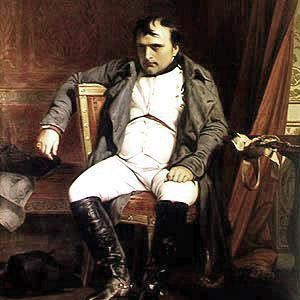
This will be the first post of a short series exploring the theme of God’s particular preference for what seems small, crude, or inadequate by worldly criteria. Today, we look briefly at the account of David’s selection as king from 1 Samuel 9-16:
 After the Israelites first abandoned the notion of God as king of the nation in favor of a more objectified source of political power, God graciously provided one for them – He gave them what they wanted. Tuned to its most Christian pitch, the idea of a king can be radically egalitarian. A king poses as a figure for the entire nation, simply because the king does not earn his position but is chosen almost arbitrarily. King George VI of the recent movie “The King’s Speech,” for example, did nothing to earn or even desire his position – it was conferred on him by sheer grace, even gratuity. Because of the arbitrariness of his position, the king theoretically could just as easily have been anyone else, provided they had the good fortune to be born in the royal family. Although it seems unjust from a meritocratic, opportunity-focused American culture, the fact that the king does not earn his position is what allows him to be an everyman, a stand-in for a nation.
After the Israelites first abandoned the notion of God as king of the nation in favor of a more objectified source of political power, God graciously provided one for them – He gave them what they wanted. Tuned to its most Christian pitch, the idea of a king can be radically egalitarian. A king poses as a figure for the entire nation, simply because the king does not earn his position but is chosen almost arbitrarily. King George VI of the recent movie “The King’s Speech,” for example, did nothing to earn or even desire his position – it was conferred on him by sheer grace, even gratuity. Because of the arbitrariness of his position, the king theoretically could just as easily have been anyone else, provided they had the good fortune to be born in the royal family. Although it seems unjust from a meritocratic, opportunity-focused American culture, the fact that the king does not earn his position is what allows him to be an everyman, a stand-in for a nation.
Who, therefore, should be the one to unify and constitute a nation? With Plato’s Republic and a long tradition of political thought, a good guess would be someone intelligent, virtuous, humble, personable, successful, and perhaps physically fit. If we didn’t buy into this idea, American candidates for office could save millions on trying to portray themselves as the most successful, the most ethical, or the best educated.
All of these are laudable traits in a political leader, but God’s notion of kingship cut against the grain of any expectations. Who can constitute a nation? God sends Samuel out to the countryside, where he runs into a boy searching after donkeys who tries to pay the prophet for help finding them. This insignificant boy, “from the least of the tribes of Israel ,” whose “family is the humblest of all the families” in that tribe, feels hopelessly overwhelmed by this arbitrary – and frankly irrational – choice of the next king (1 Sam 9.21). Why the tribe of Benjamin, the youngest (and therefore the least by rules of primogeniture) of all the tribes? Because it removes absolutely any chance of meritocracy. If God’s choice extends to greatest tribe, or to the religious leaders, or to wealthiest and most accomplished people in society, what’s left for the rest of us? In Saul’s choice, God demonstrates profoundly that social prestige, outward religious devotion, and career success cast not the slightest pale over God’s valuation of us.
 David’s example is even more vivid. Samuel finds Jesse’s eldest (and therefore greatest) son and heir to be physically attractive, tall, imposing – in a word, kingly. And yet “the Lord does not see as mortals see,” and the chosen one ends up being the youngest, the kid who wasn’t even invited to see the great prophet with all his brothers! Had one of the first seven sons deemed worthy to see the great prophet been chosen, they would not have symbolically represented the man below them, the man left out in the fields, the man with the sheep. In choosing the lowest and least, however, God chooses everyone. Since anyone else could have been a more logical choice than David (or so his dad thought), David represents the complete gratuity of God’s favor and functions as a living symbol that His favor is utterly unearnable.
David’s example is even more vivid. Samuel finds Jesse’s eldest (and therefore greatest) son and heir to be physically attractive, tall, imposing – in a word, kingly. And yet “the Lord does not see as mortals see,” and the chosen one ends up being the youngest, the kid who wasn’t even invited to see the great prophet with all his brothers! Had one of the first seven sons deemed worthy to see the great prophet been chosen, they would not have symbolically represented the man below them, the man left out in the fields, the man with the sheep. In choosing the lowest and least, however, God chooses everyone. Since anyone else could have been a more logical choice than David (or so his dad thought), David represents the complete gratuity of God’s favor and functions as a living symbol that His favor is utterly unearnable.
In choosing the least, God chooses the whole – for the great Hebrew writers, nothing less would do. Later, we’ll look briefly at this ‘theme of the least’ for Jesus Christ –perhaps been best summed-up in Simeon Zahl’s “Nazareth principle,” the idea that God brings good out of the most random and unlooked-for places.

COMMENTS
6 responses to “And the Least Shall Be the Greatest: Royal Résumés and Social Equality”
Leave a Reply














Fabulous concept. “God brings good out of the most random and unlooked-for places.” Hopefully a Flannery O’Connor reference or two along the way.
Beautiful beautiful stuff, Will. There is something undeniably gracious about aristocratic entitlement… At least in contrast to cutthroat meritocracy. Seriously! Can’t wait to read the next installment.
Thanks for the post!
Your points about Benjamin’s tribal status are rightly stated and cohere with Saul’s own words. However, I wonder at your overall characterization of Saul in light of the beginning of the chapter: “There was a man of Benjamin whose name was Kish, the son of Abiel, son of Zeror, son of Becorath, son of Aphiah, a Benjaminite, a man of wealth. And he had a son whose name was Saul, a handsome young man. There was not a man among the people of Israel more handsome than he. From his shoulders upward he was taller than any of the people.” Some of these descriptors seem to jive pretty well with kingly archetypes. What do you make of them?
Likewise, I wonder at your characterization of David. God does indeed say (in reference to David’s eldest brother), “Do not look on his appearance or on the height of his stature, because I have rejected him. For the Lord sees not as man sees: man looks on the outward appearance, but the Lord looks on the heart.” However, the description of David still includes these physical details: “Now [David] was ruddy and had beautiful eyes and was handsome.”
I’d appreciate your thoughts on these items.
Hey Greg –
Unfortunately, none of these stories totally fit the literary categories people try to thrust on them. So the exceptions of physical appearance are rightly noted.
A couple of tentative answers: first, people are naturally sinful and, to meet them where they were, God may have had to provide a king with strong physical attributes, simply because these characteristics were politically important at the time. Additionally, for Saul (though not David), this physical stature would have driven home the point that God shames the strong things of this world and chooses the weak – but now we’re getting a bit too speculative…
Second, it certainly seems like it’s more difficult to claim physical attributes as gift than it is to claim religious/status/socioeconomic achievements. As boys, neither of these men had achieved much in terms of economic success or prestige – they were too young. So meritocracy is still excluded in this case, because their looks were strictly congenital – a gift. Neither of those answer your question thoroughly, but hopefully they’re thought-provoking.